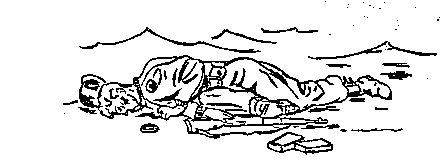
 AT 'EM AGAIN
AT 'EM AGAIN
 AT 'EM AGAIN
AT 'EM AGAINIt was rather queer what a relief it was for a while -- no more worrying about going into action, we were leading the attack now and could lose some of our pent up feelings. For a while one has that "let me at 'em" feeling, but not for long! You begin to think maybe the Jerries have the same feeling and maybe a personal grudge against you. We were in front now and even beginning to see familiar landmarks -- this was almost the same route we had taken back in December when we hit Rott. We cleared several little towns without incident (leaving talkative Crabtree behind once when he got to talking to some woman who claimed to have a cousin or someone in Ohio, or maybe it was New York. He, of course, said he was clearing out a basement, not talking, but we always wondered!)

Then Woerth was ahead, good old Woerth where we had guarded bridges in January and then retreated. We gathered in a woods about half a mile from town and waited for our forward elements to look over the ground ahead. The town was defended and we were going to attack at 4 o'clock on the nose. Our second platoon was going in on the right, C company on the left, and our platoon, with Blank's squad in front, in the center. At a wave from the captain, Crabtree, our first scout, moved out of the shelter of the woods into the open, Crawford, number two man, close behind, then Blank and then me, as BAR man, fourth. The others followed.
We ran as fast as we could in the soft earth, first to a heavy clump of tall grass, then to a small embankment and on to a wood pile -- then nothing but a clear hill and the waiting Germans were ahead. Their machine gun opened up and bullets cracked like fire-crackers over my head as I ran -- why they didn't lower their range and kill us all, I'll never know, but their aim remained high. I ran uphill until I thought I would drop but the top was still hundreds of yards ahead and the krauts still firing. Our own machine guns were cracking then (we had outrun our own artillery and the town had not been shelled) and our mortar platoon was beginning to throw shells toward the hill. One of their first shells was short and exploded just to the left of me but fortunately no one was hurt.
We were finally reaching the crest of the hill, could see the Germans in their holes but they had quit firing, and began to come out with their hands up -- kill as many of us as they could, then yell quits, was their old game -- and the hill overlooking the town was ours. One German, walking out to meet us, failed to halt when we shouted at him; he kept right on walking through our ranks. Someone fired a shot over his head; he kept going. A sergeant raised his M-l, fired and the bullet crashed into the Jerry's shoulder, knocking him flat. He stayed there then.
For several minutes we were busy digging in in case the enemy started shelling the hill but soon came the order to move down on the town. One squad went ahead of ours but by the time we reached the first house we were all mixed. Several men stopped in a barn but Crabtree, Crawford, Blank and I went on to the front of the next house and dodged into a ditch along the road -- then all hell started popping again.
A German machine gun started raking the road just above our heads and four Germans poked their heads out of the house behind us -- wanting to surrender. Crabtree and Crawford made a dash to the house during a lull in the firing while the rest of us tried to locate the machine gun, but in vain. We fired at every spot we thought it could be coming from but it kept on "strafing" us.
Title Page Previous Page Next Page
This page maintained by Bruce Clayton.
Copyright © 2008 by Bruce D. Clayton, All rights reserved.